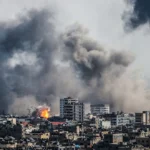Alhaji Mohammed Hayatu-Deen is a former Chief Executive Officer (CEO) of FSB International Bank. Hayatu-Deen who chaired the economy sub-committee of President Muhammadu Buhari’s transition committee in 2015, chaired by late elder statesman, Ahmed Joda, in this interview, speaks on why he has ventured into politics after close to 40 years in the corporate world and how to address the rising inflation in the country.
You just revalidated your membership of the Peoples Democratic Party (PDP). What informed your decision to join politics?
Today is another chapter in my life, in the sense that I have had a very long corporate career, for almost 40 years, and the time has now come to do something different on a national scale.
So I have revalidated my membership of the PDP in Borno State. It is important for me because this is the land where I was born and bred, and it is customary and the tradition to always go back home to make such a major shift in your career and life.
What are you aspiring for?
My aspiration right now is to influence the platform of the party by making sure that certain issues militating against the development of our country are addressed, especially the issue of insecurity. As we go towards 2023, I will like to see a lot of debate around the issue of insecurity.
The second thing that I am interested in is that the nation is fractured and divided, and what I would like to see is to bring the country back together so that we can celebrate our unity in diversity.
A lot of issues that are going on are one; they are products of extreme poverty, and when people are very poor and devastated, divisions come in.
Thirdly, the way the country is governed, particularly at the level of the states, these people are very despondent and it leaves them with bitter disappointment. So, it is important therefore to reunite the people by doing what is right for them; by giving some services. These are the kinds of ideas that I have. I will like to build them into a policy blueprint so that throughout the campaign season these things will be pushed, depending on the agenda, so that if the PDP wins the election in 2023, both at the national and sub-national levels, these matters are brought to the front burner as important issues of our time and must be dealt with because the country is facing a great danger.
For how long have you been in PDP, because you just revalidated your membership?
My membership of the PDP has not been very long; therefore, whatever I have done with the PDP happened when they were out of office.
For about four decades you were in the corporate sector. How ready are you for the challenges in the political terrain?
These things lie in the eyes of the beholder. Number one, you will have to recognise that we run a democratic form of government, and to be able to operate a democratic form of government, we need to have political parties, establish a political process under which the parties and individuals contest for elections and either win or lose. Competition can sometimes be fierce and maybe dirty and ugly, but I think what we need to isolate is the competition for power versus governing the country after power is won.
So the process may not be tidy, but once you win, you are there because of the popular will of the people; you must carry out the mandate that is assigned to you.
Therefore, I have no problem with joining politics. I have no problem with going in there to use my own sets of values to influence outcomes.
Since 1999 Borno has been governed by ANPP and now APC. What do you want to do differently to ensure your party wins in 2023?
Remember that I am not contesting for any office; I am an ordinary member and my loyalty goes to the party; part of that loyalty is to do everything within my power, my modest means to try to make sure that PDP gets power in the state.
On what I am going to do, these are early days. There is a need to be determined as to why the PDP has not been winning elections in Borno State. Number two is the fact that there are things that are going on within the party here in the state that have divided the leadership into various factions.
So the first thing to do is to get into arbitration to bring about a consensus and rally the troops so that we can focus on a singular objective of unifying the party. A house divided is a house that cannot function; unity of the party is very important; that is the first thing. I will also bring about clarity to the body of ideas that they need to put together to show the people of Borno that they have a superior platform, a superior message and a set of messages compared to the APC.
The third thing is to go on a massive recruitment drive, to try to change the hearts and minds of people, to come on the train. These are not going to happen amid rancour, they can only happen if and when you have a very substantive message. You show clarity of purpose, sincerity, determination and hard work to achieve these objectives.
You were a member of the transition committee when Buhari won; your name was forwarded to the National Assembly as an ambassadorial nominee, but after some time it was withdrawn, what happened?
Is that not history? I was not consulted, I saw my name on the pages of newspapers and I took the action and my name was withdrawn, as simple as that.
APC is the ruling party, why would you join the opposition party, what is the attraction?
Is there anything that says because there is a particular party in government, you cannot join an opposition party? To answer your question, I am a very keen observer of national affairs, and having seen what has happened over the last 13 years, I have taken the view that in recent months the PDP will appear to have gotten its acts pretty much together. They seem to have organised their affairs in such a way that they are preparing themselves in readiness for the 2023 elections. Remember that they were in power for 16 years, so they have a very long experience in power out of the 25 years since democracy was introduced.
Secondly, the way and manner they went about electing the leaders of their party; I think is commendable. No dust was raised.
I particularly have faith in Dr Iyorchia Ayu because he brings strong credentials – political, institutional and public – to the party. Beyond that, he is a very quiet and strategic individual. He was my classmate in the university, so I have known him for almost 40 years.
Therefore, under his leadership, I have a feeling that the party will organise itself and get a shot at winning elections, and more importantly, I think there are profound lessons that they have learnt.
Based on your background, one of the challenges facing this country is inflation, how do you think the federal government can tackle it?
Inflation is a monster, it is a function of so many variables. One is that our national output has contracted considerably, and therefore when there are supply shortages, prices tend to go up, so price disruptions are introduced into the economy and we know that we had negative growth for a considerable period. Since about 2015 our economic growth rate has been declining.
It is going up now, but when you compare it to population growth, it is almost zero. Do not forget that the pandemic for almost two years now has had a very negative effect on the economy, along with that is banditry and terrorism, then farm outputs have also declined considerably, which have resulted in very sharp price increases. On top of that is the notion that exchange is very important, because money supply, monetary aggregates work in consonance with each other. Because the naira has deteriorated from about N300 to N560, and this is an import-dependent country!
What is the way out?
The way out is to rebuild confidence in the country. When you and I are at each other’s throats because I come from Maiduguri and you come from Ogbomosho, all you do is fighting, and it does not engender confidence in the country. You need to build confidence by unifying the people.
The second thing is that because the economic management is not so good, you are not able to attract investments either domestic or foreign into the country, you cannot expand output. Infrastructure is dilapidated, so the cost of doing business is very high. Oil companies are busy divesting from Nigeria; all of these things combined will exhaust the country and suck the confidence out of the system. Every business, every country functions at its optimum when business confidence is very high.
Apart from building confidence and attracting investment, what other things should we do to up the value of the naira?
The naira and the dollar are nothing but commodities, and commodity prices are determined by several factors, but most importantly is availability. First and foremost, what you are seeing as the current value of the naira to the dollar is a reflection of our inability to generate foreign exchange. If we do so the naira will find its value; that, in turn, is a function of our national output, because this is a huge country sitting on very large resources. It is still a very nascent country in terms of its latent potentials in relation to resources because we have not been able to exploit and harness our resources. If you drop a seed anywhere in the country, unlike other countries that live in the desert, it is going to sprout; it is an extremely rich country with abundant mineral resources. Our people are extremely intelligent and our service sector can be expanded. Those are the things I believe need to be done to ameliorate the value of the currency and bring about stability. So we need to export, once we export, we get a lot of dollars, but right now I think the naira is reflecting its true value.




